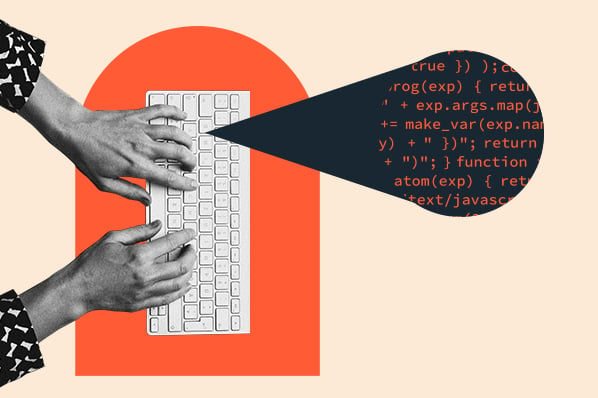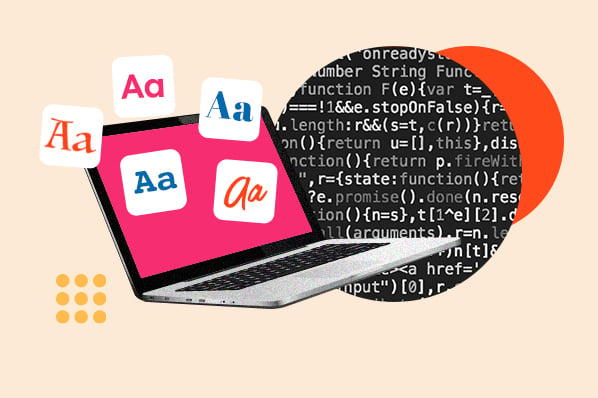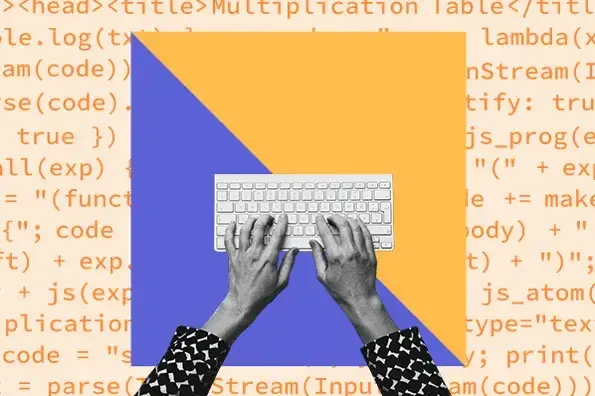If you’re reading this, you probably feel a little bit terrified and fascinated, just like I did. Perhaps you want to learn how technology is changing our world, create tools that tackle actual problems, or open up a six-figure job. Whatever drives you, here’s what matters:
I taught myself to code between anatomy lectures and laboratory practicals. My technical experience? Zero. My tools? A decade-old laptop and sheer stubbornness. Five years later, I have created and collaborated with a lot of genius programmers on lots of fascinating projects.
Coding didn’t just change my career; it also rewired how I think. In this blog, I’ll help you skip my early mistakes and launch your journey with clarity.
Table of Contents
- What is coding?
- Why learn to code?
- How to Start Coding
- Coding vs. Programming
- Programming Languages
- Tips for Coding for Beginners
- My Favorite Coding Resources
What is coding?
Coding is the process of using programming languages to give instructions to a computer. These instructions tell the computer how to perform specific tasks. Coding also powers the websites, software, and applications people use every day.
Programming languages like Python, Java, and C++ provide the syntax and structure needed to write these instructions in a way that computers can understand and execute. We can hereby say coding is translating human intent into instructions that machines understand.
Why learn to code?
Every action has a purpose or motivation, and learning to code is no exception. Curiosity was what motivated me. I began learning to code after reading briefly on coding and noticing how many issues I could resolve using my coding abilities.
You may have your reasons why you have decided to learn how to code, but if you are just a curious learner like I once was, here are a few reasons why learning to code is beneficial and why you should do it, in case you are torn between two options and are still unsure.
Coding helps build professional skills and helps you earn more.
As of 2025, the average entry-level salary in the U.S. is $43,262, but the average starting salary for a programmer is $74,690, which is ~75% more.

One reason salaries in the coding and tech industry tend to be high is because software scales in a way most professions simply can’t.
For example, a doctor can treat one patient at a time, but a single line of code or a well-built software solution can serve millions of users simultaneously. According to Coursera, a leading online learning platform, 6 out of 8 top high-income skills for 2025 involved some sort of coding experience.
That’s the true power of coding: Once you create something valuable, it can be used, reused, and scaled without much additional labor. Just look at platforms like Facebook, which serve billions of users daily. The effort put into writing the code once continues to deliver value over and over again, at a massive scale. That kind of impact is a big part of why coding is such a high-income skill.
Coding lets you create things.
If you are creative or, in general, someone that likes building and experimenting on things, then coding can help you do just that. I, for example, am a software developer, and the thrill of successfully building an application is unmatched; watching my idea being implemented and come to life brings me joy.
Whether I want to monetize my project, post it on an open-source platform like GitHub, or just make things as a hobby, I have the knowledge and the tools to do so. Projects are essential to the learning and job-seeking process.

Coding can help you better understand the world around you.
Learning even just the basics of computer programming will help you understand the components of the growing technology landscape. You’ll gain an entirely new perspective on the technologies in your life and an appreciation for how it all comes together.
Coding is fun.
Most people remark about how difficult coding can be, but they rarely mention how much fun it can be. So far, I’ve found coding to be a really interesting and entertaining experience. I now do it not just as a career but also as a hobby, and I like the creative process of creating things, making mistakes, and fixing them.
How to Start Coding
In recent days, coding has been quite popular, and there are multiple resources on how to get started with coding on the Internet. But with the sheer volume of options, a new coder who just picked up the interest for coding might be a little bit overwhelmed and might not be able to find a good foundation to build on.
If I were to start learning how to code again from the beginning, it would be a whole different experience. Here are some of the things I would advise someone who wants to learn how to code to do.
1. Figure out why you want to learn to code.
With the current rise in AI, the tech world is now much more visible than ever, and many people are curious about how they can use different technologies to make their tasks easier. Some might even find themselves delving into coding out of curiosity.
Curiosity is a great starting point; that’s actually what got me into coding in the first place. I was fascinated by how apps and websites were built and wanted to understand the “magic” behind them.
But here’s the thing: Curiosity alone won’t sustain you.
While I was initially drawn to code out of interest, what truly kept me going was my passion for problem-solving. I loved the idea of building things that could actually help people or solve real-life challenges.
That drive gave me purpose, something to return to when things got frustrating (and trust me, they will). And that’s what most beginners miss. They jump in without a clear reason, and when the learning curve hits, they quit.
So before you write your first line of code, ask yourself:
- What do I want to achieve with this skill?
- Am I solving a problem? Exploring a career change? Trying to build a specific project?
When you find your “why,” you’ll have a reason to keep showing up, even on the hard days.
2. Choose which coding language you want to learn first.
Now that you have a clearer idea of why you’re learning to code, it’s time to pick your first programming language — which depends entirely on that goal. As you know, many technical fields involve coding, such as web development, data science, machine learning, etc.
For deeper insights, explore this Coursera blog on coding careers. You’ll see there are countless paths to choose from, each with its own learning approach.
Every field has languages best suited for it. Personally, I started with HTML and CSS. Though not technically programming languages, they’re foundational to web development.
Note that learning a programming language can take time, so don’t be harsh on yourself if you aren’t getting it right away.
3. Take online courses.
While some people learned coding in school through computer-related majors, I learned online from the comfort of my home. At the start, I didn’t know where to find the best resources, but as I kept going, with guidance from friends, I quickly figured it out.
Thousands of free online courses exist for whatever field you’ve chosen. Just make sure to begin with one that introduces you to the basics of your chosen coding path.
For me, courses create essential structure for learning. Computer science concepts build on each other, so organized coursework keeps everything digestible and ensures you learn in the right order.
Check out websites like zerotomastery, which provide clear learning paths for any coding career.

Popular free course providers include:
- freeCodeCamp
- W3Schools
- Scaler Topics
- Harvard’s acclaimed Introduction to Computer Science course on edX and the CS50 YouTube channel
These choices are excellent for figuring out early on whether you’re prepared to devote the necessary time to learning a language. You can also find many premium courses for a fraction of the price of in-person classes.

These choices cover a wide range of beginner, intermediate, and advanced CS topics:
Some paid services offer free courses or trials if you want to get a feel for their teaching before you commit.
4. Watch video tutorials.
I consider video tutorials the best way to learn coding; it is my personal favorite. Coding is highly practical, and while books have value, videos make concepts tangible and much easier to understand.
I learned web development specifically from two tech tutors: Brad Traversy and Jonas Schmedtmann. I highly recommend them if you’ve chosen web development as your path.
There’s a wealth of video tutorials online; you can access free content on YouTube or paid courses on Udemy. Depending on your chosen field, research the top instructors. Watch one or two videos from them and see if you like their teaching pattern, and then decide if you want to commit to them.
5. Read books and ebooks.
Learn HTML & CSS with this Free Ebook
Prefer an old-school approach? Pick up a book on your beginner language of choice. Books will introduce you to fundamental concepts and inform your coding.
Here are some established texts that I recommend for each beginner language.
- HTML/CSS: The Beginner's Guide to HTML and CSS for Marketers
- JavaScript: Eloquent JavaScript: A Modern Introduction to Programming
- Python: Python Crash Course
- C: C Programming Absolute Beginner’s Guide
- C++: C++ Primer
- C#: C# 8.0 and .NET Core 3.0 – Modern cross-platform development: Build applications with C#
- Java: Effective Java
- PHP: Head First PHP & MySQL
- Ruby: The Well-Grounded Rubyist
- SQL: SQL in 10 minutes, Sams Teach Yourself
- Swift: Swift Programming: The Big Nerd Ranch Guide
6. Use tools that make learning to code easier.
Most beginners obsessively collect tools at the start of their coding journey, assuming they need advanced applications or paid subscriptions. This simply isn’t true. With four fundamental tools, a code editor, browser, terminal, and version control system, you’re fully equipped to begin.
Code Editor
This is where you write your code. Forget the fancy ones for now; you need something that just works. Visual Studio Code (VS Code), in my opinion, is the best code editor. It’s beginner-friendly, free, customizable, and supports pretty much every language you’ll ever need. It also has a built-in terminal, version control, and extensions that can guide you as you code.

If you want to experiment, I also recommend:
Terminal / Command Line
You’ll eventually need to run code and manage files from a terminal. For this, you have two options:
- Built-in terminal on your OS (Command Prompt for Windows, Terminal on Mac/Linux). You can use these shortcuts to access the terminal depending on your operating system.
- Windows (Command Prompt / PowerShell):
Win + R, then type cmd or powershell, and press Enter. - Mac (Terminal):
Command + Space, type Terminal, and press Enter. - Linux (Terminal):
Ctrl + Alt + T

VS Code Integrated Terminal
If you choose VS Code as your code editor, you can access its built-in text editor at the bottom of the application.

When you start coding, you should learn the command line and how to navigate the terminal. Familiarize yourself with how to use it, including the basic UNIX commands, since you’ll be doing things that aren’t possible in the GUI.
Browser
A browser can serve as your testing lab. Most browsers have DevTools, which is non-negotiable. You can inspect elements, debug, and test your code. My go-to browser is Google Chrome. It’s easy to use and very beginner-friendly.
Version Control System
A version control system is used to keep track of your projects and back them up. With Git + GitHub, you can save versions of your code, push your work to GitHub, and maybe even collaborate.
Why this works:
- Zero cost. All tools are free.
- Industry standard. Used by FAANG engineers and beginners alike.
- Minimal setup. Install in under 15 minutes.
- Scalable. Same tools build to-do apps or enterprise software.
Coding vs. Programming
The terms ‘coding’ and ‘programming’ are often used interchangeably, but they aren’t identical. Both involve writing instructions for a computer.
Programming, however, encompasses broader elements like algorithms and data structures. Typically, programming describes more advanced work involving larger, complex projects. These often require structured project management and deeper technical knowledge.
|
Feature |
Coding |
Programming |
|
Focus |
Translating logic into machine-readable language. |
Building entire applications using logic, structure, and problem-solving. |
|
Scope |
Narrow - mainly writing syntax. |
Broad - includes problem-solving, system design, debugging, testing, etc. |
|
Skills Required |
Basic knowledge of syntax and programming language. |
Knowledge of algorithms, data structures, and system architecture. |
|
Complexity |
Usually simpler and more straightforward. |
Often complex and requires deeper knowledge. |
Programming Languages

Your chosen coding field will often require proficiency in specific languages. For example:
- Web development leans heavily on JavaScript.
- Mobile apps demand Java/Kotlin.
- AI/Machine Learning thrives on Python.
While you can technically interchange languages (like using Python for web apps or Java for ML), prioritize the most efficient tool for the job.
Python dominates ML not just through capability but also because of its beginner-friendly ecosystem and vast libraries. Match your language to your field’s mainstream tools to accelerate your progress.
JavaScript

JavaScript is one of the most popular programming languages. It’s most commonly used in web development to turn static web pages into dynamic ones.
Most websites you visit use JavaScript; functionalities like clicking buttons, modals appearing on your screen, or switching between website sections are controlled by JavaScript.
This was my first programming language. It’s very beginner-friendly after learning HTML and CSS (which aren’t programming languages but markup/styling languages). I learned JavaScript first, then later React, a JavaScript library.
Why learn JavaScript? If you’re interested in web development and already have a feel for HTML and CSS, JavaScript is the next step.
Python

Python is also a popular programming language for beginners; its syntax is easy to understand, and it stands out as one of the most accessible programming languages currently existing. Python is great for automating tasks, analyzing large data, and also powering AI.
Why learn Python? If you’re interested in data science, automation, or AI, Python is arguably the best starting point. Its readability feels almost like plain English, the community support is massive, and it’s the #1 language in ML/research (IEEE Spectrum).
C

C remains one of the most system-critical programming languages decades after its creation. Unlike higher-level languages, C provides direct hardware access and minimal abstraction, making it indispensable for performance-sensitive domains.
Core applications are in operating systems (Linux kernel, Windows subsystems), embedded systems (microcontrollers, IoT devices), and high-performance computing (game engines, physics simulations).
Its core infrastructure is in databases like MySQL and languages like Python’s CPython.
When it comes to its technical strengths, C has an unmatched efficiency, a high hardware-level control, is portable, and has a high influence on modern languages (C syntax and concepts directly shaped programming languages like C++, C#, Java, and Rust).
Why learn C? I would suggest you choose C if you are interested in learning how software and hardware devices interact. As a founding programming language, you will get a lot of technical experience from learning C.
C++

C++ extends C’s capabilities by adding object-oriented programming (OOP) and generic programming features while maintaining hardware-level control. It dominates domains requiring both high-level abstraction and uncompromising performance.
C++ core applications are seen in game engines (Unreal Engine, Unity core), real-time systems (autonomous vehicles, robotics controllers), financial systems (high-frequency trading platforms), and also in database systems like MongoDB storage engines.
C++’s strengths lie in its zero-cost abstractions, OOP features like classes and inheritance, its multi-paradigm flexibility, and backward compatibility.
Just like Python, it is the core infrastructure for AI/ML frameworks (PyTorch backend, TensorFlow serving).
Why learn C++? If I am going to be honest, it is a bit of a complex syntax, which might make learning a bit more difficult, but if building performance-critical applications and developing cross-platform system software are what you are interested in, then I highly recommend you learn C++.
C#

C# is a modern, object-oriented language developed by Microsoft. It combines high productivity with robust performance through managed code execution and is the flagship language of the .NET ecosystem.
It has a strong ecosystem, as it is used in NuGet package manager, and Visual Studio IDE offers integrated tooling. C# is cross-platform and has a much more modern syntax with features like LINQ (data queries), async/await, and properties that streamline development.
C# can be used in enterprise software (ERP, CRM, and financial systems), Windows desktop apps like WinForms, WPF, and UWP, and, just like C++, it is also used in game development (Unity engine scripting for 70% of mobile/XR games).
C# is currently the #1 language for Unity. It has a 30% faster execution in ASP.NET Core vs. Node.js in benchmarks (TechEmpower). Also, it is much easier than C++ but requires understanding.
Why learn C#? You can choose C# if building Windows-integrated applications or creating cross-platform mobile games via Unity is where your interest lies.
Java

Java (not to be confused with JavaScript) is a general-purpose object-oriented programming language. Like Python, Java’s syntax is easy to read and understand by human programmers — often, complex tasks can be handled by one command.
Java is most commonly used in creating Android apps (native support until Kotlin’s rise); it is also used in enterprise backends (banking, ecommerce via Spring Boot) and creating legacy systems (20+ years of mission-critical deployments).
Why learn Java? I recommend Java if you are interested in creating Android applications or building cross-platform enterprise systems.
Pro tip: Pay close attention to understanding object-oriented programming when tackling Java, as it forms the core of its functionality.
HyperText Preprocessor (PHP)

PHP is a server-side, open-source programming language for developing web applications. It makes it easy to add dynamic information, like updated news stories, to websites. In addition to evolving beyond its early limitations, it remains unmatched for server-side HTML generation and content management systems.
PHP is mostly used in content management systems like WordPress, which powers about 43.5% of all websites. It can also be used in ecommerce platforms, server-side web logic, and API backends (Laravel/Symfony RESTful services).
PHP’s technical strengths are seen in web-optimized execution, native HTML embedding, and deployment simplicity, and it has a zero-compilation workflow (edit → refresh → see changes).
Why learn PHP? 74.5% of websites with known server-side languages use PHP (W3Techs, 2024). So if you are looking to go into building websites with WordPress or perhaps some other CMS, learning PHP might just be a great start, as it has a low initial learning curve but requires mastery and uses modern frameworks.
Ruby

Ruby is a dynamic, object-oriented scripting language prioritizing human-readable syntax and programmer happiness. Its “convention over configuration” philosophy powers rapid development, most famously in the Ruby on Rails web framework.
Ruby can be used in full-stack web development, DevOps automation, and scripting/glue logic (replaces Python/Bash in developer workflows). It has an expressive syntax with very minimal boilerplate.
Why learn Ruby? I would recommend Ruby if you are interested in building CRUD-heavy web applications rapidly, creating developer-centric internal tools, and prioritizing team velocity over microsecond performance.
SQL

SQL is another useful language for beginners. You can use this language to update, store, and retrieve data from a database. It’s also the standard language for database management systems, according to the American National Standards Institute.
It’s different from the other programming languages since it’s technically a query language, so you won’t be building web pages with it.
Why learn SQL? It can take some time to learn SQL if you don’t already have some understanding of programming.
That said, this language is popular in tech and with data professionals, so it has a lot of relevance in the workplace. It can be used when working with structured, relational data. Building ACID-compliant systems (e.g., finance, healthcare) and performing complex aggregations/reporting
Swift

If you’re learning to code to create projects for Apple devices, Swift is a good language to start with. Designers at Apple created this language with beginners in mind. And if your primary goal is to develop mobile apps for iOS devices, this should be your language of choice.
Swift’s core applications are in iOS/macOS apps. Swift is used for cross-platform development, server-side development, and machine learning. As regards Swift’s strengths, it has memory safety, a modern syntax that is beginner-friendly, and high performance.
Why learn Swift? If you are in love with Apple, it may delight you to know that Swift is the #1 language for iOS development (used in 75% of new App Store submissions).
So, if you have an interest in building the Apple ecosystem application or just developing safety-critical applications, then you should consider learning Swift.
Tips for Coding for Beginners
I know, seeing all the programming languages listed earlier might feel overwhelming. You might even be second-guessing your decision to start learning how to code. That’s completely normal.
As someone who has gone through every phase of the learning journey, I understand the mix of excitement and uncertainty that comes with being a beginner.
That’s exactly why I’ve put together these tips, to share what I’ve learned and help you take the smartest, most effective approach as you begin your coding journey.
1. Be patient.
Everything good comes with a price. Anyone can learn to code, but that doesn’t mean it’s an easy journey. Coding requires solving problems, and sometimes those challenges can be tough.
You have to remember: It’s all part of the process.
Personally, I’ve spent months on projects where a single bug kept me up for nights. But that’s coding. Stay patient with yourself, think through problems logically, and never let emotions take over.
Then there’s debugging, the part that humbles every developer. Computers are exact. They follow your instructions to the letter, which means even the smallest typo — a missing semicolon or the wrong symbol — can crash your entire program.
So yes, even beginner-level coding can be tough. And that’s perfectly okay. What matters is that you take your time, stay patient, and let things sink in as you go.
Every expert programmer started exactly where you are. They struggled, made mistakes, and slowly improved, just like you will.
2. Get comfortable with the fundamentals.
The early days of learning a programming language are all about the essentials. Most people want to quickly rush to the difficult part because they think it’s going to be more interesting, but the truth is, without a proper foundation, you will run into a lot of hurdles when coding.
The fundamentals set the foundation for you, and they are really important. Here are some essential topics you need to explore and have sufficient knowledge of before you proceed to the more difficult things:
- Variables
- Functions
- Conditional logic
- Arrays
- Objects
These concepts form the core of every programming language. While their syntax and implementation details vary, their purpose remains consistent across languages.
Just like I said earlier: Fully grasp each concept before moving forward. Everything in coding builds on previous knowledge.
Pro tip: Tackle coding challenges focused on these topics for your chosen language.
3. Write clean code from the start.
I’ve come to realize that coding and learning a programming language are no different from learning an actual language: accents form through practice, and habits develop. Don’t always look for shortcuts when learning to code; practice the most efficient, effective methods instead.
Just like any language, there are multiple ways to communicate an idea. For any given task, you’ll find dozens of ways to code it. Always strive for the most concise and human-readable solution.
Developers work in teams, meaning others will read your code. If it’s hard to decipher, they’ll dread collaborating with you.
Why is clean code important?
You might be wondering why you need to learn clean code at this point. You’re a beginner, so shouldn’t writing functional programs be the main goal?
Well, yes. This is about establishing good habits early. If you put in the extra work now, you’ll save yourself (and others) some sanity down the road. Here are some ways to write clean code:
- Keep code lines and functions short. If possible, add a linter rule that detects longer lines and suggests you wrap them. I recommend limiting each line of code to 80 characters max and each function to no more than 15 lines.
- Make commenting a habit. Comments are segments of code that aren’t processed by the computer, so you can write whatever you want inside them. Programmers use comments to clarify the purpose of their code.
- Learn how comments work in your language and, at the very least, leave comments at the top of your functions explaining each one’s job.
4. Search is your friend.
I had a mentor who guided me early on. Whenever I hit a coding issue, I’d run to him for help. When I was just starting, he’d always solve my problems. Until one day, he didn’t.
He told me, “Coding is about solving problems. If you can’t fix simple bugs yourself, how will you solve other people’s challenges?”
That stuck with me. From that day on, I stopped taking issues to him. Instead, I learned to research solutions independently. When ChatGPT launched, I combined it with StackOverflow and technical blogs.
Here’s what I discovered: Research doesn’t just solve your immediate problem. It expands your knowledge in unexpected ways. You’d be shocked at how much you learn from a single Google query.
5. Complete coding projects.
Coding is intensely practical, and projects are the ultimate way to cement what you learn from tutorials. One year into my web development journey, I’d completed 20+ projects. For every new stack I learned, I built a few projects to make it stick.
Here are classics I built while learning:
- Calculator. Takes user inputs + operations → outputs results.
- Memory game. Match icons by remembering positions.
- Password generator. Creates custom passwords based on user preferences.
- Designo website. My Frontend Mentor final project after completing my course.
Why Projects Matter
Projects keep you motivated by turning abstract concepts into tangible progress. Long-term projects become proof of your skills. It’s one thing to list “Python” on your resume, another to show a full Python-built application.
For entry-level jobs, projects are a non-negotiable proof of competency.
6. Find a mentor and a community.
Having a friend or an online community to guide you can be invaluable to your learning.
First, I recommend finding a mentor. As you progress, you’ll probably encounter issues that, no matter how hard you try, you just can’t crack. This is where mentors can help.
A mentor doesn’t need to be an actual teacher. They can be anyone knowledgeable in your language. They should be able to explain difficult concepts and point you to solutions.
An experienced mentor can help you follow coding practices not covered in tutorials and offer advice for navigating a career in tech.
You may also want to join a community. Look for local groups, networking events, meetups in your area, and hackathons where you can make in-person connections with other programmers.
Online developer communities are also a rich resource for beginners.

Be sure to check out:
- Stack Overflow, a forum site for programming questions and discussion.
- GitHub, a code repository for open-source projects with an active developer community.
- Women Who Code, a nonprofit that organizes events, communities, and job postings for women pursuing careers in technology.
- r/learnprogramming, a subreddit (a microsite on Reddit.com) for beginner coders.
My Favorite Coding Resources
FreeCodeCamp

FreeCodeCamp was my lifeline when I started coding. Their 11,000+ completely free resources gave me the foundation to transition from tutorial-hopper to professional developer. I eventually became a tutor on freecodecamp.
Pro tip (from a tutor’s perspective): Don’t just passively watch tutorials. Their magic happens when you:
- Check the forum thread for your exact project.
- Study three community solutions.
- Rebuild from scratch without copying.
The catch: Zero deadlines demand serious discipline. When I struggled, joining their #100DaysOfCode X accountability group kept me shipping code daily.
Coursera

Coursera remains one of my top recommendations for structured learning. Their catalog features industry-vetted programming courses from Google, IBM, and leading universities like Stanford and Duke. While many premium courses require a subscription, free audit options exist for budget-conscious learners.
Key advantages from my experience:
- Financial accessibility. Apply for per-course aid — if approved, you get temporary access to paid content (Pro tip: download materials before access expires).
Caveat: Financial aid grants time-limited access. Inactive courses expire after six months.
- Classroom immersion. Get instructor feedback and collaborate with peers like in physical classrooms.
- Career credentials. Earn certificates recognized by employers (my Google IT Automation cert helped land three interviews).
MDN Web Docs

If you’re doing web development, MDN Web Docs is my non-negotiable reference — it’s the industry bible for HTML, CSS, and JavaScript. Maintained by Mozilla (the Firefox team), MDN has bailed me out of countless late-night coding crises over the years.
MDN web docs have an unmatched depth; their documentation goes beyond basics, has a real-time accuracy, and contains little to no fluff, just straight-up solutions without SEO-padded paragraphs.
Codecademy

Codecademy is great for diving right in and writing code almost immediately. It gives you small, digestible tasks to work on, as well as a sandbox to work in. They have courses for just about every language you can imagine.
Most of their content is free, though they have paid guided projects and career paths you can opt for, as well as career services and professional certifications.
The Odin Project

The Odin Project is an open-source, full-stack curriculum for web development. They have two paths, one using Ruby on Rails and the other using JavaScript (with the React framework).
The amount of information available is a bit daunting, but the best part about The Odin Project is that you will end up with many real projects to hone your skills and show off to potential employers by the end of it.
W3Schools

W3schools has a ton of tutorials that range from typical programming languages to frameworks and other languages like SQL and HTML. They also have plenty of example code you can play with and reference during your coding adventures.
The best part is that everything is free. They do have some paid certifications, though all of the actual information about the languages is readily available.
Stack Overflow

Stack Overflow is an incredibly popular and useful site for developers. People ask questions about coding and get feedback. Then, the answers are voted on to determine the best solution.
Even when you’re no longer a beginner, you will likely keep returning here to find answers to various questions or issues.
The community is very active, and the public platform is free. You just need to create an account to interact with others.
Coding is more than just the code.
By now, you’ve likely realized coding isn’t about writing code; it’s about solving human problems. We all picture programmers typing furiously at keyboards (it is called “coding,” after all). But when you begin, you’ll discover the truth:
Your actual workflow:
- 70% → Thinking/planning
- 20% → Debugging
- 10% → Writing new code
You’ll spend hours dissecting a login flow before writing a single line. You’ll whiteboard payment logic longer than it takes to implement it.
Syntax fades with time, but problem-solving intuition only deepens. Yes, you’ll eventually build amazing things. But first, you’ll gain something rarer: a structured approach to untangling chaos.
Editor's note: This post was originally published in December 2020 and has been updated for comprehensiveness.
HTML

-2.webp)







![14 Stunning HTML Websites [+ How They Work]](https://53.fs1.hubspotusercontent-na1.net/hubfs/53/Copy%20of%20Featured%20Image%20Template%20Backgrounds-1.webp)


![How to Embed Google Map in HTML [Step-By-Step Guide]](https://53.fs1.hubspotusercontent-na1.net/hubfs/53/Google%20Drive%20Integration/How%20to%20Embed%20Google%20Map%20in%20HTML%20%5BStep-By-Step%20Guide%5D-2.jpeg)
